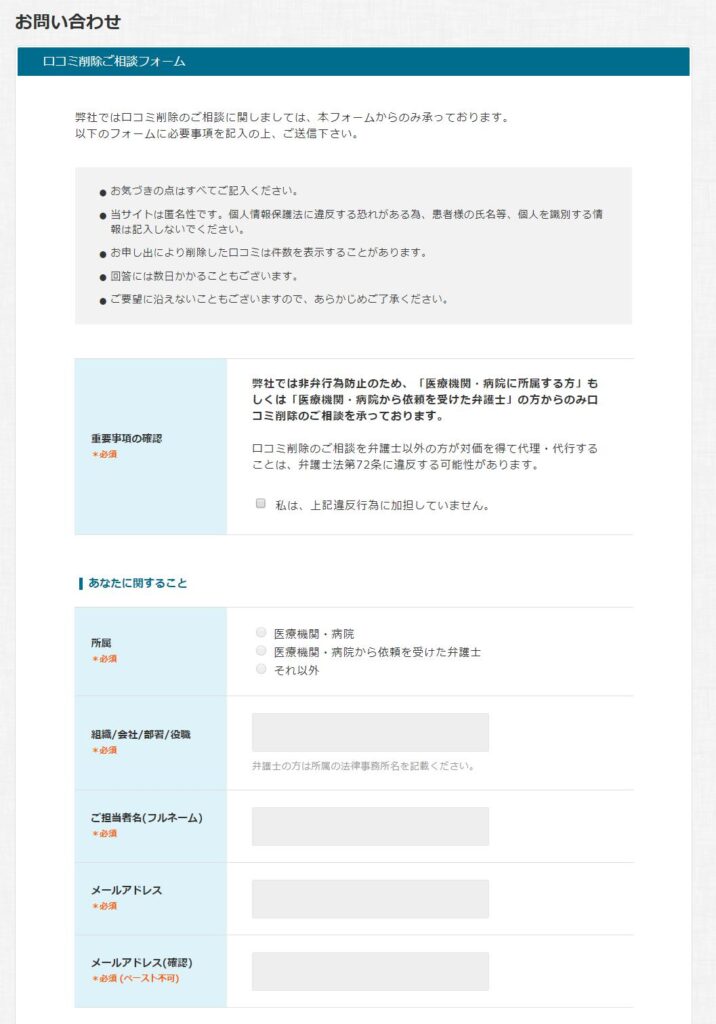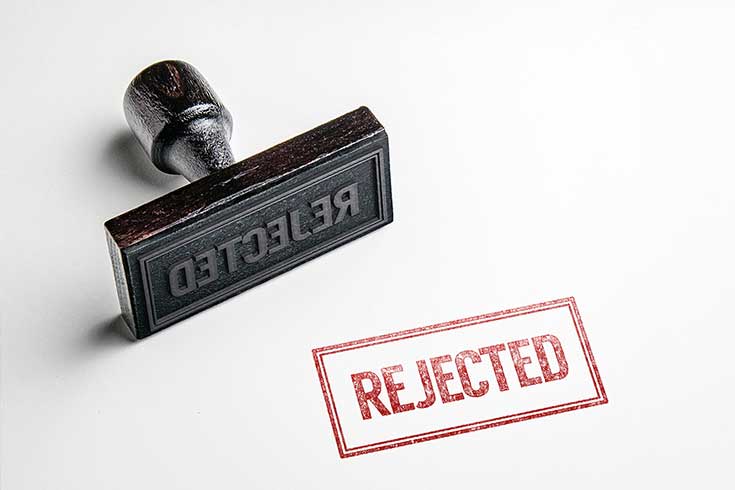What is the Method to Remove Reviews of 'Caloo' (Karū)?

Caloo is a well-known review search site for hospitals in Japan. Many of you may have used it to search for hospitals or to check the reputation of a hospital you’re considering visiting. For hospital staff, while getting listed on Caloo can potentially increase the number of patients, there may be concerns about reputational damage due to negative reviews. In this article, we will introduce how to remove reviews from Caloo that could potentially harm the reputation of your hospital.
What is Caloo?
Caloo is a website that provides various information about hospitals to help users receive the best possible treatment. It lists information such as medical departments, the presence of specialists, specialized outpatient services, as well as the medical services the hospital focuses on and their track record. The search interface allows you to set various conditions, enabling you to find the ideal hospital that meets your needs. Even if you’re unsure which department to consult, by inputting your symptoms, the system will suggest the appropriate hospital. Another feature of Caloo is its user-friendly search system. From the page of each hospital that appears in the search results, you can view reviews from users who have used that hospital. Caloo’s reviews include not only positive comments but also negative ones, which can be very helpful when choosing a hospital. Interestingly, Caloo also has a community feature, allowing users to exchange messages with each other. This means you can also receive recommendations for good hospitals from users who have experienced the same illness. In this way, Caloo is a site that provides various information to help you find the best hospital for you.
What Kind of Reputational Damage Exists?

As mentioned earlier, Caloo publishes negative reviews, so there is a significant possibility of reputational damage. In addition to the reviews, there is also a five-star rating system, and it is possible to give a low rating. In this section, we will explain the types of reputational damage that can occur on Caloo.
Poor Response from Doctors and Nurses
One of the most common complaints in reviews is dissatisfaction with the response of doctors and nurses. Comments such as “the doctor’s explanation was sloppy,” “even when I asked questions, the doctor seemed to look down on me as if to say, ‘Don’t you even know that?'” and “the receptionist nurse had no friendliness and didn’t even make eye contact” were actually seen on Caloo. It’s frustrating to receive such a careless response when you’ve gone to the hospital in desperation due to poor health. On the other hand, many positive reviews highlight the excellent response, such as detailed explanations and sincere attitudes. It is clear that hospital users value not only the treatment but also the response.
Long Waiting Times
Long waiting times are also a common complaint in negative reviews of hospitals. For busy people who intend to visit the hospital during their spare time, they may give up using the service if they hear that the waiting time is long. Also, if the hospital is crowded and there are no seats available, people with weak legs may hesitate to use the service. Thus, for hospital staff, they would prefer not to have reviews mentioning long waiting times.
Unnecessary Examinations
There are also reviews that say, “Even though it’s not necessary, they conduct examinations to extract money from patients.” Patients would prefer to keep examinations to a minimum to avoid increased expenses. If a reputation spreads that the hospital tends to conduct unnecessary examinations, leading to higher treatment costs, there is a high possibility that the number of patients will decrease.
How to Request Removal for Violation of Terms of Use
If you come across a malicious review about your hospital on Caloo, first consider whether it can be removed in accordance with Caloo’s review posting guidelines. The following types of reviews are prohibited as criteria for posting reviews.
Content not based on personal experience
At Caloo, we solicit impressions from posters who have received treatment at the hospital themselves. Therefore, content based on hearsay, such as “I heard from a friend that~”, cannot be posted. Even if you went to the hospital, if you “left without receiving a consultation because it was crowded” or “waited in the waiting room the whole time as an attendant”, posts from you are prohibited because you did not actually receive a consultation.
Posts with little useful information
Reviews must contain specific content to be useful to other users. If you write something like “Hospital XX sucks. I’ll never go there again”, it’s likely to be made private because it’s unclear what specifically is bad. Also, there is a word count requirement, so please be aware that you need to write more than 200 personalitys.
Criticism without specific evidence or overly subjective descriptions
Criticism without specific evidence includes things like “My condition worsened after going to the hospital” or “My child caught a cold because I was made to wait for a long time in the waiting room”. Overly subjective descriptions include things like “This doctor always prescribes the same medicine” or “This hospital has few patients because it cuts personnel costs”. While reviews are a place to write personal impressions and some subjectivity is fine, you shouldn’t go too far. Furthermore, cases where the hospital was used many years ago are likely to be considered unacceptable because they are based on vague memories.
Content that exceeds the scope of subjectivity, such as forcing others
As mentioned above, reviews are a place to write the impressions of those who have used the service. Therefore, content that restricts the actions of others, such as “You should never go to this hospital”, is not acceptable. Also, comments like “I can’t believe the nerve of people who give good reviews to this hospital”, which criticize the actions of others, are not acceptable. This is often seen in the comment sections of YouTube videos.
Content that criticizes specific doctors or staff
Since this is a place to write impressions of the hospital, slander against individuals is not acceptable. While content like “The reception was poor” is probably not a problem, it is not acceptable to criticize by naming individuals, such as “The response of Mr./Ms. XX at the reception was poor” or “Dr. XX has a problem with his/her personality”.
The above are common contents of negative reviews about hospitals. In addition, the following types of review posts are also prohibited:
- Complaints to medical institutions
- Content that infringes on the rights or privacy of others
- Content that goes against public order and morals
How to Remove a Review on Caloo
Review removal on Caloo is done through the “Review Consultation Form” on the official website. Please note that removal requests will not be accepted from anywhere else. Also, removal requests can only be made by “those affiliated with a medical institution or hospital” and “lawyers who have been commissioned by a medical institution or hospital”. This measure is in place to prevent unauthorized practice. You will enter details about yourself and the hospital you are affiliated with, and then move on to entering information about the review you want to remove.
The information to be entered about the review is as follows:
- “URL of the review” or “Title and poster of the review”
- Parts you believe to be different from the facts or current situation → You can just copy and paste the relevant parts.
- The basis for believing that it is different from the facts or current situation → From the above review posting criteria, write down the parts you think are in violation. For example, “I request removal because I believe it violates the criteria for review posting, as it does not seem to be based on personal experience.”

Examples of Removal Requests on the Grounds of Illegality

There may be instances where a site does not comply with a removal request. In such cases, if the review is deemed to be defamatory and illegal, you can request its removal. However, it is a high hurdle to prove that a review is defamatory. Defamation is not recognized unless it “publicly discloses facts and lowers social evaluation”. “Publicly” refers to the dissemination of information to an unspecified number of people. As anyone can see the reviews on Caloo by searching for a hospital, there is no issue with this condition.
However, in order for it to be considered defamation, the content of the slander must not be factual. Subjective content such as “The doctor at that hospital is not skilled” is not recognized. Furthermore, it must be recognized that the social value of the hospital has declined due to the review. Because these three requirements need to be met, the hurdle is quite high. Even if you manage to overcome it, defamation will not be established unless the review is recognized as having “public interest”. Public interest, so to speak, is when the disclosure of the fact is beneficial to society or people. For example, if a hospital is covering up a medical error, and a review discloses this fact, it is recognized as having public interest and defamation is not established.
For more detailed explanation on the “requirements for defamation”, please refer to the article below.
https://monolith.law/reputation/defamation[ja]
Removal by Provisional Disposition
The court can issue an order to Caloo to “remove this review”. This is called a provisional disposition, and its personalityistic is that it can respond more quickly than court proceedings. There is a risk that the log of the post may be deleted and the poster may not be able to be traced while waiting for the court proceedings, so speed is important for review removal. However, in order for the court to decide on a provisional disposition, it is necessary to prove the fact that rights are being infringed upon based on legal grounds. It is almost impossible for a layperson to make such a claim, so it is advisable to consult a lawyer.
For more details on “Provisional Disposition for Removal”, please refer to the article below.
https://monolith.law/reputation/provisional-disposition[ja]
Identifying Users through Provisional Dispositions
In provisional dispositions that do not go through a trial, it is possible to identify users. If you win in a provisional disposition, you can find out the IP address of the computer that made the post, and thus determine which computer the post came from. If you know the whereabouts of the other party, you can directly demand them to “Delete the post!” However, as a site, there is a need to protect personal information, so they may not readily agree to disclose information. As discussions can easily become tangled, we recommend consulting with a skilled attorney.
Summary
Caloo is a website where you can view hospital reviews. Reviews about a particular hospital, both good and bad, are posted, making it a reliable source when deciding whether to use the hospital. However, there is also the potential for reputational damage. First, use the posting criteria in the usage guidelines to request deletion from the form yourself. If the site does not respond, consider taking legal action. When it comes to deleting reviews, a provisional disposition is recommended for its speed over a lawsuit. However, legal claims can be challenging for laypeople, so it’s advisable to hire a lawyer.
Category: Internet





















